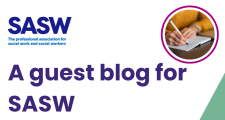Blog - cultural awareness could be the key to building trust between social workers and families from diaspora communities

As Scotland becomes increasingly diverse, social workers must be given the tools and confidence to engage positively with cultural differences. International social work charity, Children and Families Across Borders (CFAB) explains how being culturally inclusive could be key to addressing biases and improving relational practice.
Over the years at CFAB, we’ve heard many stories from social workers about how a lack of awareness of diverse cultures and religions has obstructed their engagement with families...
“When I first started in social work practice, I worked with an Orthodox Jewish family. My first visit to them was on a Friday evening. I disturbed their Sabbath and inevitably eroded any potential trust I could have established with the family if I had understood their religious practices better.”
- Social Worker in North London
As social workers, we all know that we can do our best work when children, young people, and families feel respected and understood. At CFAB we believe that engaging with children’s heritage and culture is always complimentary to their best interests. This is especially true as we develop our rights-based practices. Article 30 of the United Nations Convention on the Rights of a Child emphasises the right for children from minority groups to take part in the language, customs and religion of their family, whether or not they are shared by the majority of people in the country where they live.
Unfortunately, children’s culture and heritage are not always protected in larger structures. Work is now being done to correct this, including by the Social Work Anti-Racism Oversight Group which just launched a national review in a bid to address ‘systemic racism’ in our sector. Cultural bias disadvantages people from minority ethnic groups, and this is often compounded by anxieties about discussing race and cultural traditions. We know that many well-meaning social workers feel unprepared to question harmful practices, which can inadvertently enable situations that put some children at risk.
If social workers feel confident and supported to engage positively with cultural differences and address traditions that put children at risk, then we can build a stronger and more inclusive social workforce.
We noticed there was a considerable gap in resources to help social workers build up their cultural knowledge. This is why we created our Cultural Family Life Library – a series of free guides introducing professionals to the history and culture of families from diaspora communities.
Our guides detail family structures, ethnicity and religion, perception of social services, communication, and other cultural contexts worth considering when supporting a family. Though no resource can cover the nuances and complexities of a culture, our guides are a strong starting point for social workers to build on cultural strengths or to appropriately question specific cultural practices.
Our library so far has guides on working with families of Nigerian, Romanian and Jamaican heritage, all of which were produced with the support of professionals and experts from each community. Even if you don’t work with children or families from the cultures covered by our library, our guides are a great baseline tool to get you thinking about the different cultural considerations that should guide your practice.
About Children and Families Across Borders (CFAB)
CFAB is a UK-based charity with nearly 70 years of experience in international child protection. CFAB assesses long-term care options for children — wherever possible reuniting them with their family. As the only UK charity with an inter-country social work team, CFAB operates a free professional Advice Line and supports 80% of local authorities in the UK on cross-border children and family cases.
CFAB also provides training on culturally inclusive practice with limited spaces. Culturally Inclusive Practice: Essential Skills for Social Workers Tickets, Tue, Jan 28, 2025 at 9:30 AM | Eventbrite